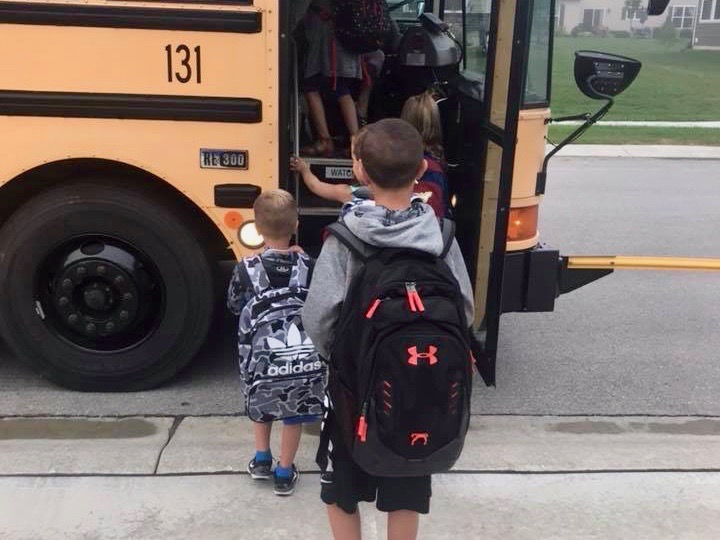
People who remember the cloak room or folding a piece of paper into eight sections probably started kindergarten in the fifties like I did. That was an era when parents were more ghosts than helicopters and when The Teacher’s word was respected and feared.
My youngest grandchild starts kindergarten next week. Here’s hoping he gets a loving teacher who understands that young children learn best in a play-based kindergarten.
I started school in Detroit at Maccullough Elementary, about six blocks from our house. I remember it as an old red brick building with doors at either end. Right after Labor Day in 1950, a few days before my fifth birthday, I walked there with my mother. I held her hand tightly. In my world, no one went to preschool or childcare. I’m not sure what I did for five years. I think I just played, as in “go outside and play.” Aside from being left in the Hudson’s Department Store play area while my mother and aunt shopped, or in the care of my aunt or grandparents, going to kindergarten was truly my first step away from my home. It was a huge deal. But parents didn’t really worry very much about children’s feelings in the fifties.
Back then, there was a rhyme that greeted kindergarteners,
Kindergarten baby, Wash your face in gravy
It didn’t make any sense back then and is pretty mild as teasing goes these days. But it ran through my mind as my mother took me to school that first day. I remember her handing me off at the door. I was terrified but knew enough not to embarrass her by crying. The teacher seemed nice enough, but there were so many rules. The room smelled of chalk dust and Spic and Span. Aside from the cloak room, I have very few memories of what we actually did in the few hours a day I attended kindergarten.
The cloak room, however, is a metaphor for all of my fears about starting school. It was a huge, open closet filled with hooks for our jackets, but it doubled as a place of banishment for bad behavior. Rumor had it that children sent there for not complying were somehow attached to one of the hooks to ensure they wouldn’t leave until their punishment had ended. I’ll never forget a red-haired boy named Mark B. because he spent so much time in the cloak room for various infractions. Is it possible the teacher really attached him to a hook by his shirt? Hopefully not, but that’s how I remember it. Being sent to the cloak room was a fate I avoided by keeping my head down and saying nothing. Great start to elementary education.
My own kids went to a play-based preschool before they started kindergarten back in the late seventies and early eighties. As an educator, I was disappointed by their kindergarten experience. It was a half-day hybrid of attempts to learn to read a few words, “writing” using invented spelling (none of them could decode what they had written), music, and free play. They still had a housekeeping play area, art easel, and dress-up clothing. The teacher was pretty old-fashioned (Anyone remember Miss Francis from Ding Dong School?), and all three of my kids stood in long lines to have her inspect their “work.” She chastised my son for coloring outside of the lines, and told my older daughter (a child not yet five whose fine motor skills were still developing) she should try harder to print neatly on paper with no lines to guide her efforts. With my youngest, all I remember is her being punished for flushing the baby cow down the toilet.
I had high hopes things would be better for my grandkids. If anything, they were worse. With a full day to fill now, kindergarten was more like first grade had been for my kids. Unfortunately, child development doesn’t change and having unrealistic expectations only makes children feel like failures at five. One of my grandsons, a generous, creative little boy, started kindergarten when he had just turned five, making him the youngest boy in the class. I hoped school would bring him as many happy moments as the Star Wars backpack he proudly carried would hold. At the same time, I worried about the demands of formal schooling, given the trend since Bush’s No Child Left Behind, followed by Obama’s Race to the Top, for setting unrealistic standards and developmentally inappropriate expectations for young learners. Would kindergarten crush this free-spirited and rather young boy?
My grandson had three specific questions at the start of school:
1) Will my teacher be nice?
2) Can I get cookies?
3) Do they have a tiger robot in their toy area?
Of course, cookies were out because snacks needed to be healthy. Sadly, there were no toys, so tiger robots existed only in his imagination. But things began well enough and he seemed to love his teacher. On the first day, she taught my grandson what was to become the highlight of his kindergarten year, the Ants in Your Pants song. She had them sing this to relieve the restless tension they all felt from too much sitting and too many worksheets. At first the song seemed to do the trick.
As the year progressed, while his teacher was nice enough, she was also bound to a curriculum and expectations, complete with homework, that would have been challenging for most first graders. Her evaluation as a teacher would be based on how well these five-year-olds learned the prescribed curriculum, as measured by tests. So, while things began happily enough, kindergarten soon devolved into a high-pressured school experience that required external motivators to keep these young learners in line. And every week homework packets filled with developmentally inappropriate tasks were stuffed into his Star Wars backpack. My grandson felt betrayed. Somehow, Darth Vader had slipped into his kindergarten experience.
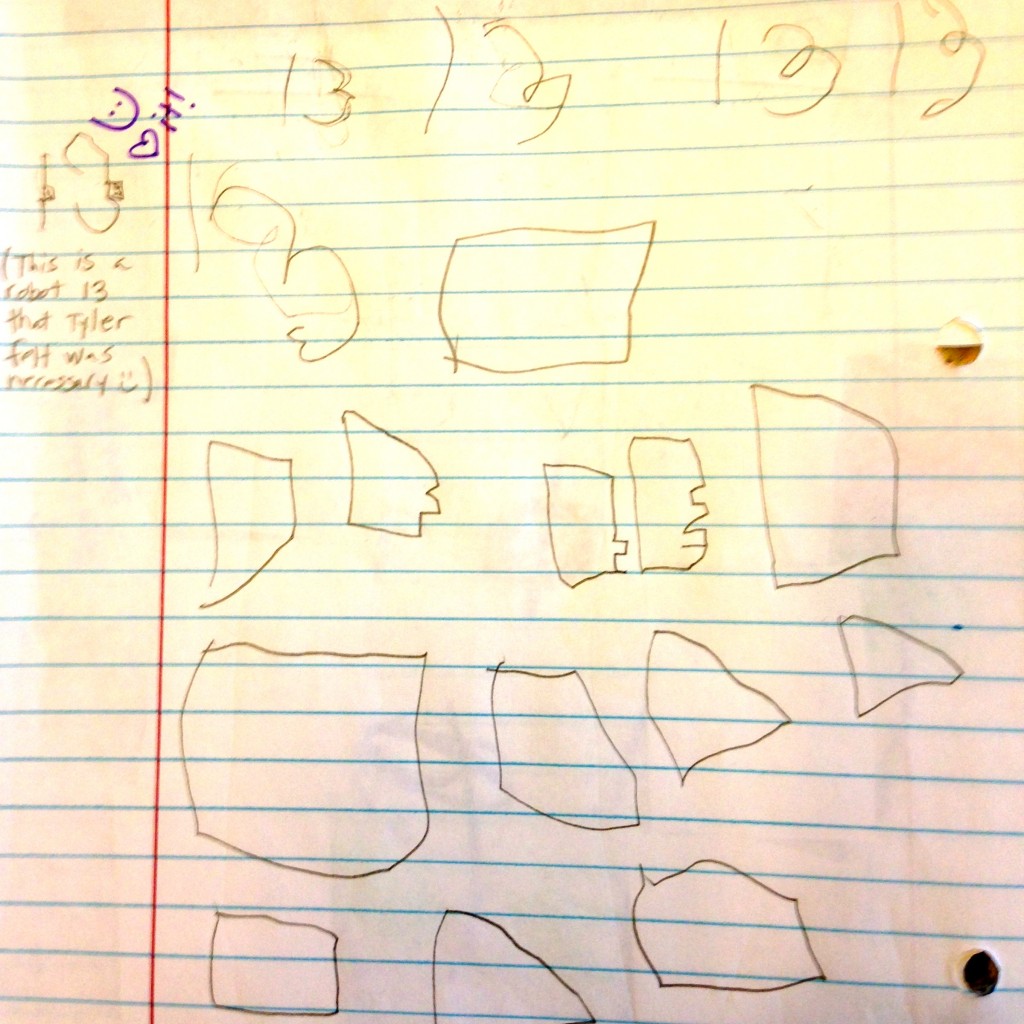
Math homework: “Write the number 13 five times in your notebook. Be sure to use the finger space between your number 13’s. Say the name of each number after you write it. Draw 13 squares in your notebook” He couldn’t resist turning those boxes into robots.
The first public kindergarten started 146 years ago in St. Louis, Missouri. It was based on the model created in Germany by Friedrich Froebel, a “kindergarten” (a garden of children), in which teachers served as the “gardeners.” In his program, young children learned through play rather than being drilled on facts. Perhaps the kindergartens of my and my children’s childhoods weren’t exactly play gardens, but they were typically a part-day experience designed to help children acclimate to a formal school environment. The main lessons were to learn to behave, follow directions, and get along with other children. This was by no means perfect, but it was better than today’s pressure cooker.
As an early childhood educator, I firmly believe that play is the work of young children. Children learn by doing, creating, and exploring. Memorizing facts, drilling children to take tests, and trying to teach every young child to read begins far too early in our society. The sad result is the loss of play and fun in the lives of many children. As the wise Fred Rogers said,
When we treat children’s play as seriously as it deserves, we are helping them feel the joy that’s to be found in the creative spirit…It’s the things we play with and the people who help us play that make a great difference in our lives.
My youngest grandchild starts kindergarten next week. After several years in childcare, he’s far readier than kids of my generation were. Still, he’s a young boy who deserves an experience better than mine or his father’s, who got to play but was criticized for coloring outside of the lines. Here’s hoping he gets a loving teacher who understands that young children learn best in a play-based kindergarten.
To read more about inappropriate kindergarten expectations these days, check out my posts Kindergarten Homework is Absurd, More Absurd Kindergarten Homework, and Last Weekend’s Inappropriate Kindergarten Homework. I’m pretty passionate about this topic.
I invite you to read my book Terribly Strange and Wonderfully Real and join my Facebook community.
Boomer. Educator. Advocate. Eclectic topics: grandkids, special needs, values, aging, loss, & whatever. Author: Terribly Strange and Wonderfully Real.


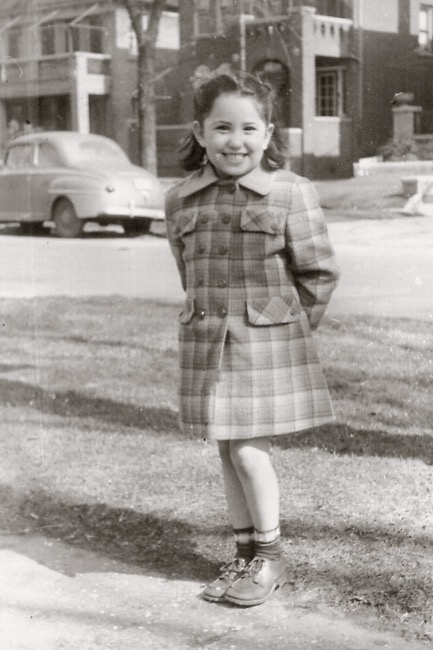
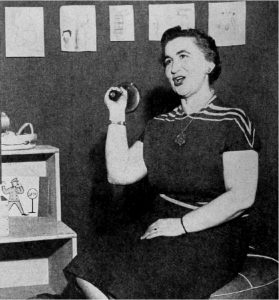
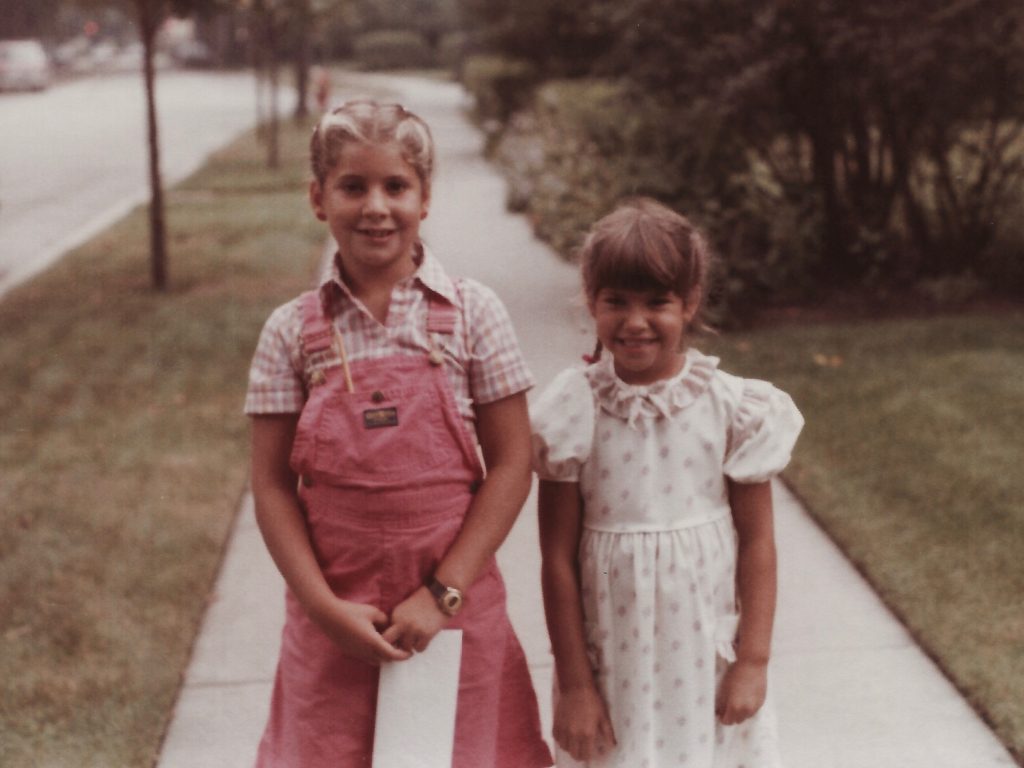
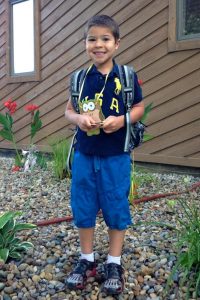

Laurie, I am old enough to remember those cloak rooms (I also went to elementary school in Detroit, as you will read). My first grade teacher was abusive to one little boy, who, as I’ve thought about it through the lens of time and knowledge, I’ve come to realize had ADHD. He couldn’t sit still. She made him sit in the waste basket and chew chalk!
I am so sorry to read about the current state of kindergarten. It was bad enough when my 30 year old went through it. I totally agree with you; children should be allowed to play and be creative. They shouldn’t be doing worksheets that are not appropriate to their developmental level, just because imposed requirements say they must do these for our country to get ahead. It is clear that our educational system is failing most students now anyway. We are in a sad state of affairs.
OMG, Betsy. Putting a child in a waste basket and making him chew chalk! Although my third grade teacher in Oak Park paddled a boy everyday when he came to school to remind him to behave. I’m glad those things aren’t so common, although similar awful things do happen too often for children in special education. I wrote a blog post about a small girl locked in a closet at one of our local schools until she could regain control of her behavior. Of course, it only made her more upset until she exhausted herself from crying. I’m going to read your story now.
Laurie, this is amazingly educational for someone who doesn’t have kids. It’s so disappointing the expectations that are foisted on young children. My niece has a January birthday and my brother wisely decided to hold her back. Fortunately there was a six-month program for kindergarten, which she loved, and then she was truly ready for first grade.
OMG, the cloak room? That was a scary punishment, I recall. I do remember Miss Francis well. Also, anyone remember Romper Room? My second cousin Russell, whose father worked for NBC, was on that show at age 4, and I watched it.
Marian, I also remember Romper Room. I think shows like that and cartoons were considered great tv for kids. When Fred Rogers started his original show, he did it in part because children’s television consisted of those shows or programs in which someone threw a pie in another person’s face. I don’t think that stuff was great for kids, but neither is sitting in a classroom doing worksheets when you are just five.
I do remember the cloak room, crucial repository of our coats, hats, boots, and leggings. But I grew up in New Jersey. In warm climates I bet they never had cloak rooms – my children’s schools certainly didn’t. And I don’t remember the cloak room being used as a punishment place. Now I’m wondering if it was, and I just repressed it.
Interesting to learn about the different experiences of your kids and grandkids. I read all three of your posts that were linked at the bottom of your story. You make such excellent points, I hope everyone reading this story reads those links too!
For my youngest daughter, who went to kindergarten in 2001, we chose a Waldorf methods school, because we liked the emphasis on playing, and cooking, and hiking, and art. Waldorf schools don’t even introduce reading until 3rd grade. But it turned out to be a terrible fit for Molly, because she didn’t have good fine motor skills and flunked “finger knitting.” They said she had to do another year of kindergarten, so we moved her to another school so she could go to first grade – which meant she had to be tutored in reading and arithmetic over the summer, because at most schools they learn that in kindergarten now.
Suzy, Molly’s experience reminded me of a friend of mine, a brilliant woman, who was going to be held back in kindergarten because she couldn’t cut on the line. Luckily for her, she had a mother who (unlike mine) didn’t always assume the teacher was right and protested. She still can’t cut that well, but has accomplished so much in life. Thank you for reading those posts. I was so outraged back then because I knew what was happening was wrong and it did turn him into a homework-hater for life. Also, it was so hard on my daughter who had a full time job and was managing three little kids on her own back then.
Terrific story, Laurie and wonderful pictures. I agree completely with your take on what kindergarten should be. I so remember Miss Francis and Ding Dong School! As for cloak rooms. Ahem. As I indicated in my First Dates story, cloak rooms can serve an entirely different – and better – purpose.
I have to go back and read your first dates story, Tom. Tomorrow is the big day for my youngest grandchild. Fingers crossed that kindergarten will not undo some of his best qualities in the service of forcing academics down his throat.
Thanks for both the great memories and the great insights. As to the former, I still recall Miss Frances from Ding Dong School from my own childhood (we used to joke about having a D.D.S, degree) and Miss Molly from Romper Room from my daughters’. My girls loved Miss Molly, but my particular recollection was the end of one show when, among others (e.g., the usual suspects of Mommy, Daddy, etc.), she also gave a shout out to “the guys on the trading floor at Bear Stearns” (apparently, her fiancee worked there).
I also appreciated your wise thoughts as an educator as to what Kindergarten should be all about: “play is the work of a young child. ” I was for many years on the board of the Bank Street College of Education (in NYC, but not on Bank Street), where my daughters started their educational adventures, and Bank Street taught exactly that same lesson.
LOL about Miss Molly’s connections with Bear Stearns. John, I commend you for your years on the board of Bank Street College of Education. Bank Street School was the gold standard in developmentally appropriate early childhood education. So sad that educational reformers over the past couple of decades have not included people who are actually experts in the field in their No Child Left Behind and Race to the Top policies.